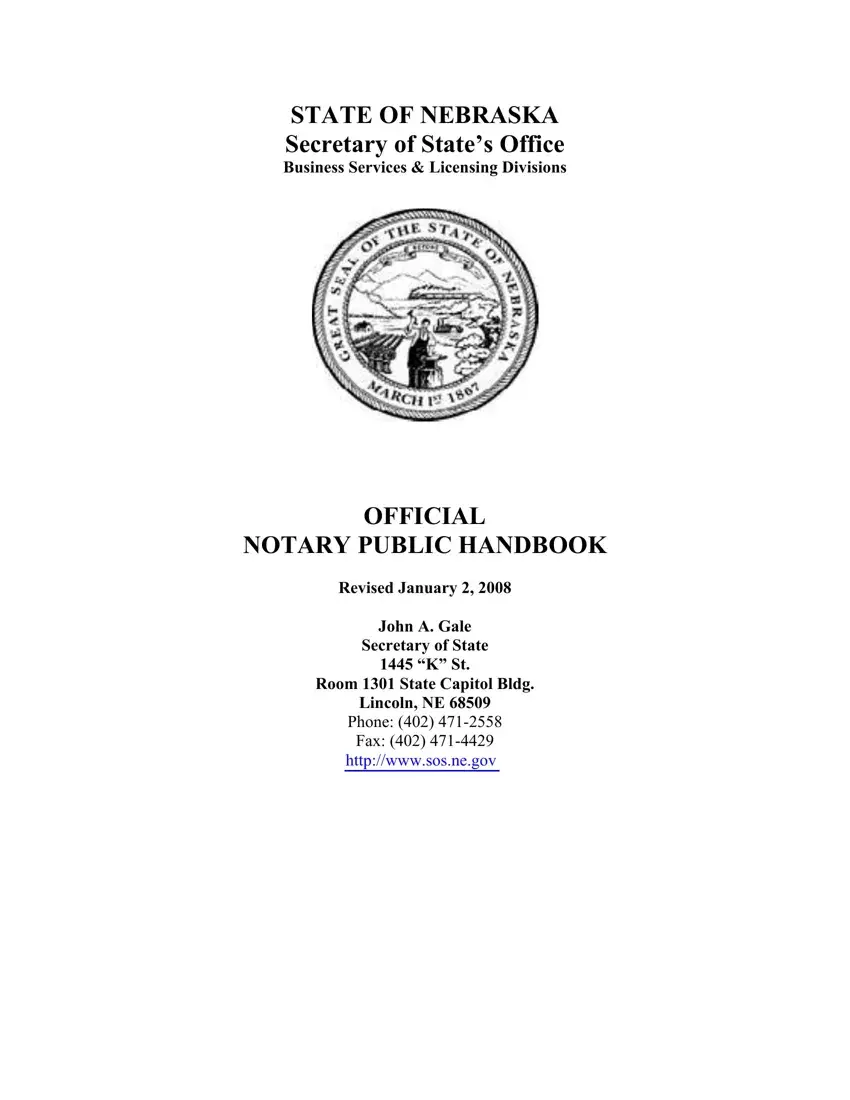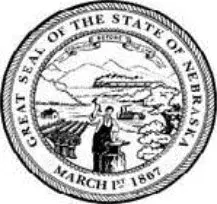STATE OF NEBRASKA Secretary of State’s Office
Business Services & Licensing Divisions
OFFICIAL
NOTARY PUBLIC HANDBOOK
Revised January 2, 2008
John A. Gale
Secretary of State
1445 “K” St.
Room 1301 State Capitol Bldg.
Lincoln, NE 68509
Phone: (402) 471-2558
Fax: (402) 471-4429
http://www.sos.ne.gov
Message from John A. Gale
Secretary of State
As Secretary of State, I am responsible for issuing and enforcing licenses for Notaries Public in the State of Nebraska. With some 30,000 commissioned Notaries, my goal is to help our Notaries be aware of their responsibilities under the law, and to keep our standards high.
Our banking, real estate, and legal professions depend heavily on notarized documents to be filed for public record. Proper notarization is key to document reliability.
.
My staff is available to assist with your inquiries. In the performance of your duties as a Notary Public, please help us insure that our documents meet the law.
Nebraska Notary
Procedures, Ethics, and Laws
I. DEFINITIONS:
AFFIANT: The person who makes and subscribes his signature to an affidavit.
AFFIDAVIT: Any written statement or declaration of facts, made voluntarily, in which the signer swears under oath before a Notary Public that the statements or declarations in the document are true.
AFFIRMATION: A solemn declaration made by persons who conscientiously decline taking an oath. An affirmation is equivalent to an oath and is just as binding. If a person has religious or conscientious scruples against taking an oath, the Notary Public should have the person affirm.
APOSTILLE: Used to authenticate the signature of Notaries and other public officers with Notarial powers on documentation going overseas. An Apostille in the form prescribed by The Hague Convention of October 5, 1961 shall conclusively establish that the signature of the Notarial officer is genuine and that the officer holds the designated office. The Secretary of State or his or her deputy shall be authorized to sign the Apostille.
ATTESTATION CLAUSE: The declarative wording, official signature, dates, and seal contained in the notarization. See also “Notarial Acknowledgment” below.
AUTHENTICATION: Used for the same purpose as an Apostille (see above) for documents going to countries which are not part of the Hague Convention.
BOND: A Notary Public bond is conditioned on the faithful performance of the duties of the office of Notary Public and may be recovered to the full amount of the bond by a person suffering damages as a result of a Notary not faithfully performing their duties. A bond in the sum of fifteen thousand ($15,000) dollars, with an incorporated surety company as surety, must be executed, approved by, and filed in the office of the Secretary of State prior to a Notary being commissioned.
DEPOSITION: The testimony of a witness taken out of court or other hearing proceeding, under oath or by affirmation, before a Notary Public or other person, officer, or commissioner before whom such testimony is authorized by law to be taken, which is intended to be used at the trial or hearing.
INSTRUMENT: Document, paper, contract, etc. to be signed or executed.
JURAT: The clause written at the end of an affidavit stating when, where, and before whom (Notary) such affidavit was sworn and that the contents of his/her written statement is true.
NOTARY PUBLIC: A public officer commissioned by the Secretary of State for a four-year term. The Notary must be a resident of the State of Nebraska. The commission issued by the Secretary of State authorizes the Notary Public to administer oaths and take acknowledgments anywhere in the State of Nebraska. The signature and seal of a Notary Public is necessary to attest to the oath of truth of a person making an affidavit and to attest that a person has acknowledged that he/she executed a document.
NOTARIAL ACKNOWLEDGMENT: The section at the end of a document where a Notary Public verifies by notarization that the signer of the document presented satisfactory evidence of identity, appeared in the Notary’s presence, and that he/she actually signed the document. See also Neb. Rev. Statute §64-205; 23-1311.
NOTARIAL ACT: Notarial Act means an act which the laws and regulations of this State authorize Notaries Public of this State to perform, including the administering of oaths and affirmations, taking proof of execution and acknowledgments of instruments, and attesting documents.
NOTARIO PUBLICO: Spanish or Latin American word for Notary Public. However, Latin American Notario Publicos are generally attorneys specially appointed by their governments who have authority well beyond that granted Nebraska Notaries. Use of the term “Notario Publico” by non-attorney notaries is prohibited by law in Nebraska.
OATH: Swearing to tell the truth, this would subject the oath-taker to prosecution for the crime of perjury if he/she knowingly lies in a statement either orally or in writing. Traditionally, the oath invokes reference to a deity (under God); however, this may be omitted (see also “Affirmation”).
PERSONAL KNOWLEDGE OF IDENTITY: Familiarity with an individual resulting from interactions over a period of time sufficient to dispel any doubt about the individual’s identity. (See Neb. Rev. Statute §64-105)
PRINCIPAL: The person executing the document before the Notary or taking the oath that the Notary administers.
PROTEST: A formal statement in writing by a Notary Public, under seal, that a certain bill of exchange or promissory note was on a certain day presented for payment, or acceptance, and that such payment or acceptance was refused.
SATISFACTORY EVIDENCE OF IDENTITY: For purposes of proving identity of the
principal to the Notary, “satisfactory evidence of identity” shall mean: (1) at least one document issued by a government agency that is current and that bears the photographic image of the individual’s face and signature and a physical description of the individual, except that a properly stamped passport without a physical description is satisfactory evidence; (2) the oath or affirmation of one credible witness unaffected by the document or transaction to be notarized who is personally known to the Notary Public and who personally knows the individual; or (3) the oaths or affirmations of two credible witnesses unaffected by the document or transaction to
be notarized who each personally knows the individual and shows to the Notary Public documentary identification. (See definition for “Personal Knowledge of Identity”) Nebr. Rev. Statute §64-105.
SEAL: Ink stamps used by the Notary on all attestation clauses. See additional information below in Section IV NOTARIAL SEALS.
SUBSCRIBED: Signed.
II. FEES:
Notary Public Fees: Nebr. Rev. Statute §33-133
˜For taking affidavits and seal: $2.00
˜For adm inistering oath or affirmation: $2.00
˜For each certificate and seal: $5.00
˜For taking acknowledgm ent of deed
or other instrument: $5.00
˜For each protest: $1.00
˜For recording each protest: $2.00
˜For each notice of protest: $2.00
˜For each m ile traveled in serving notice, mileage at the rate provided in section 81-1176.
III.GUIDELINES AND GOOD PRACTICES FOR PROPER NOTARIZATIONS:
1)There must be an attestation clause each and every time a notarial act is performed. Simply signing as a Notary Public and affixing your Notary Seal is not a proper notarial act.
2)If a document to be notarized does not have an attestation clause, a Notary may not give advice to the principal as to what type of notary attestation clause to use.
3)A Notary may not give advice to the principal on the legality of the contents of the document or whether the principal should sign the document, unless the Notary is a licensed attorney.
4)Before notarizing, ask the principal for identification (see definitions for: “Personal Knowledge of Identity” and “Satisfactory Evidence of Identity”)
5)Prior to notarizing, the Notary should look over the document to be notarized to be sure there are no blank lines or spaces in the document. Blank lines or spaces should be: a) completed by the principal(s) or b) crossed through by the principal(s) prior to notarization. Failure to do so, leaves the document open to easy alteration after the notarial act is performed.
6) |
The |
principal must appear in the physical presence of the Notary to sign the document to |
|
be notarized. No exceptions. (See Neb. Rev. Statute §64-105). |
7) |
Notaries |
may not perform a notarial act if they are in the same immediate family. This |
|
includes in-laws, step- or half-relatives. Notaries are to be a disinterested witness to a |
|
transaction and should not stand to gain personally or financially from the outcome of the |
|
document to be notarized. (See Neb. Rev. Statute §64-105.01). |
8) |
Notaries |
may not notarize their own signature. |
9)Notaries are required to purchase an ink stamp seal containing specific statutory information. (See Section IV - Notarial Seals). Hand drawn representations of Notary Seals are not allowed.
10)It is suggested that when a document contains a blank space for commission expiration, the information should be completed in its entirety.
11)If information in the document is incorrect, the principal may cross through the error and insert the correct information. If an error is made when completing the attestation clause, the appropriate party should cross thorough the error and insert the correct information.
Correction fluid should never be used to correct or to remove an error.
12)The date in the attestation clause must match the date the principal affixes their signature as a Notary may not pre-date or post-date when performing the Notarial Act.
13)All information in the attestation clause must be properly filled in:
•State: Nebraska
•County: Name of county in Nebraska where notarization occurs
•Carefully insert names and dates as specified in the attestation clause.
•Make sure all principal(s) have signed the document and dated the document (if applicable).
•Notary must sign their name, affix their Notary Seal, and include expiration date. (If expiration date is not stated in notary seal)
14)Notaries may not certify or copy certify that a government record is valid or authentic. (Example: Birth Certificate) Only the issuing government agency may certify or copy certify official records they have filed or issued as part of the function of their government office.
15)Notaries who include the month, day, and year of their commission expiration date on their Notary Seal must obtain a new inked stamp if they renew their commission at the
end of their four-year commission period. Notaries may not cross through and insert a new date or use correction fluid to change information on their Notary Seal.
16)The Notary signature must be a written signature as a Notary may not use a rubber stamp to affix their name when notarizing a document.
17)The principal’s signature may not be a rubber stamp. If the person is physically incapable of signing a document, please see # 30 below for requirements for Signature by Mark.
18)Notaries should not notarize signatures for minor children.
19) Notaries may not copy certify, authenticate, or notarize pictures, photographs, artwork, scripts, and the like as it serves no legal purpose nor has any force or effect. A notarization is a signature witnessing of a person attesting to a written document.
20)Employers who pay for the Notary Commission fees for their employees should not retain the Notary Seal or Certificate of the employee upon the employee’s removal from their employ as a Notary. A Commission is issued to a person, not the company who paid the fees.
21)Mobile Notary/Signing Agent: Advertisements promising that Notaries may earn a large income from providing Mobile Notary/Signing Agent services for loan closings are often misleading the public. Notaries in Nebraska may only charge fees as stated above in Section II Fees.
22)Notaries may not perform marriage ceremonies in Nebraska. Only three states have statutory provisions for Notaries to officiate at marriage ceremonies and Nebraska is NOT one of the three states.
23)When notarizing, a Notary must affix a clear and legible impression of their ink stamp on the document so that all information on the seal is easily read.
24)The seal and signature of the Notary may NOT be affixed over printed wording or other signatures on the document.
25)When notarizing, the Notary must sign their name exactly as commissioned. The Secretary of State’s office does verify the similarity of the Notary signature on notarized documents to the Notary’s signature on file on their Notary application and/or bond, particularly when preparing Apostilles or Authentications for notarized documents to be sent to foreign countries. It is imperative that Notaries complete the attestation clauses accurately and sign their names properly to avoid delays for documents needing to be processed and sent to another country.
26)A person residing in a state bordering Nebraska, but employed in Nebraska, may not make application to be commissioned and may not use their employer address as their
residence address to falsely obtain a Nebraska Notary Commission.
27)The $15,000 Surety Bond is not “insurance” to protect the Notary, but rather to protect the public against improper notarization. The Notary Bond may pay only an amount up to the face value of the bond to the aggrieved party and the bond company will attempt to collect the amount paid out from the Notary. Damages to the aggrieved party in excess of the $15,000 Surety Bond may be brought against the Notary in court. (See Neb. Rev. Statute §64-109).
28) Notarization does not guarantee the legal sufficiency or truthfulness of the contents of a document. Notarization guarantees that: a) the principal(s) identity is known to the Notary or proven by satisfactory evidence or credible witness and b) the principal(s) personally appeared in the presence of the Notary to sign or execute the document.
29)If the Secretary of State holds a hearing based on allegations of malfeasance in office by a Notary Public and finds that the Notary Public is guilty, the Secretary of State may temporarily suspend or permanently revoke the Notary’s Commission. A Notary whose commission is temporarily revoked or permanently suspended must cease notarizing and return their Seal and Commission Certificate to the Secretary of State’s office. After the period of temporary revocation has been fulfilled, if the person wants to again be commissioned as a Notary Public, they must begin the commission application process again, which includes successfully taking and passing the written examination, properly completing an application, obtaining a new $15,000.00 surety bond, and paying the $30.00 commission application fee. (See Neb. Rev. Statute §64-113).
30)There are now two procedures for signature by mark for those unable to sign by reason of physical incapacity:
Procedure #1: A document signer is only able to affix a ‘mark’ in lieu of affixing his/her signature:
1)The document signer may affix his/her ‘mark’ in the presence of:
˜The Notary; and
˜Two (2) witnesses unaffected by the docum ent
2)Both witnesses must sign their names beside the ‘mark’ made by the document signer.
3)The Notary Public writes below the “mark”:
˜“Mark affixed by (nam e of signer) in the presence of (names and addresses of the two witnesses) and undersigned Notary Public.
4)The Notary Public notarizes the signature by “mark” through an acknowledgment, jurat, or signature witnessing. (See Neb. Rev. Statute §64-105.02).

Procedure #2: A document signer is physically unable to sign his/her signature or affix by “mark” a representation thereof:
1)A Notary Public may sign the name of the person physically unable to sign or make a “mark” on a document presented for Notarization, if:
˜The person physically unable to sign his/her nam e or make a ‘mark’ on a document directs the Notary Public to do so in the presence of two (2) witnesses unaffected by the document.
˜The Notary Public signs the person’s nam e in the presence of the person and the two witnesses.
2)Both witnesses sign their own names beside the Notary’s “proxy” signature for the person unable to sign.
3)The Notary writes below the signature: “Signature affixed by Notary Public in the presence of (names & addresses of the two witnesses).
4)The Notary Public notarizes the signature through an acknowledgment, jurat, or signature witnessing. (See Neb. Rev. Statute §64-105.02).
IV. NOTARIAL SEALS
Seal: (1) Each Notary Public, before performing any duties of his or her office, shall provide himself or herself with an official seal on which shall appear the words:
˜State of Nebraska, General Notary OR State of Nebraska, General Notarial
˜His or her nam e
˜Date of expiration of his or her com mission
Seal: (2) The official seal of a Notary Public shall be an ink stamp seal with which he or she shall authenticate all of his or her official acts.
NOTE: Round seals are discouraged as there may NOT be enough space allowed on a document to properly affix a round seal.
Suggested Size: 2” x ½”
Suggested Shape: State of Nebraska or Rectangular
State of Nebraska General Notary
John Q. Citizen
Comm Exp: 7-16-2008
State of Nebraska General Notarial
John Q. Citizen
Comm Exp: 7-26-2008
V. NOTARIES PUBLIC STATUTES:
64-101 Appointment; qualifications; term.
1)The Secretary of State may appoint and commission such number of persons to the office of Notary Public as he or she deems necessary.
2)There shall be one class of such appointments which shall be valid in the entire state and referred to as general notaries public.
3)The term effective date, as used with reference to a commission of a Notary Public, shall mean the date of the commission unless the commission states when it goes into effect, in which event that date shall be the effective date.
4)A general commission may refer to the office as Notary Public and shall contain a provision showing that the person therein named is authorized to act as a Notary Public anywhere within the State of Nebraska or, in lieu thereof, may contain the word general or refer to the office as General Notary Public.
5)No person shall be appointed a Notary Public unless he or she has taken and passed a written examination on the duties and obligations of a Notary Public as provided in section 64-101.01.
6)No appointment shall be made if such applicant has been convicted of a felony or other crime involving fraud or dishonesty.
7)No appointment shall be made until such applicant has attained the age of nineteen years nor unless such applicant certifies to the Secretary of State under oath that he or she has carefully read and understands the laws relating to the duties of notaries public and will, if commissioned, faithfully discharge the duties pertaining to the office and keep records according to law.
8)Each person appointed a Notary Public shall hold office for a term of four years from the effective date of his or her commission unless sooner removed.
64-101.01 Written examination required.
The written examination required by section 64-101 shall be developed and administered by the Secretary of State and shall consist of questions relating to laws, procedures, and ethics for notaries public. All applicants for commission as a Notary Public on and after July 16, 2004, shall be required to take and pass the examination prior to being commissioned.
64-102 Commission; how obtained; bond.
Any person may apply for a commission authorizing the applicant to act as a Notary Public anywhere in the State of Nebraska, and thereupon the Secretary of State may, at his or her discretion, issue a commission authorizing such Notary Public to act as such anywhere in the State of Nebraska. A general commission shall not authorize the holder thereof to act as a Notary Public anywhere in the State of Nebraska until a bond in the sum of fifteen thousand dollars, with an incorporated surety company as surety, has been executed and approved by and filed in the office of the Secretary of State. Upon the filing of such bond with the Secretary of State and the issuance of such commission, such Notary Public shall be authorized and empowered to perform any and all the duties of a Notary Public in any and all the counties in the State of Nebraska. Such bond shall be conditioned for the faithful performance of the duties of such office. Such person so






